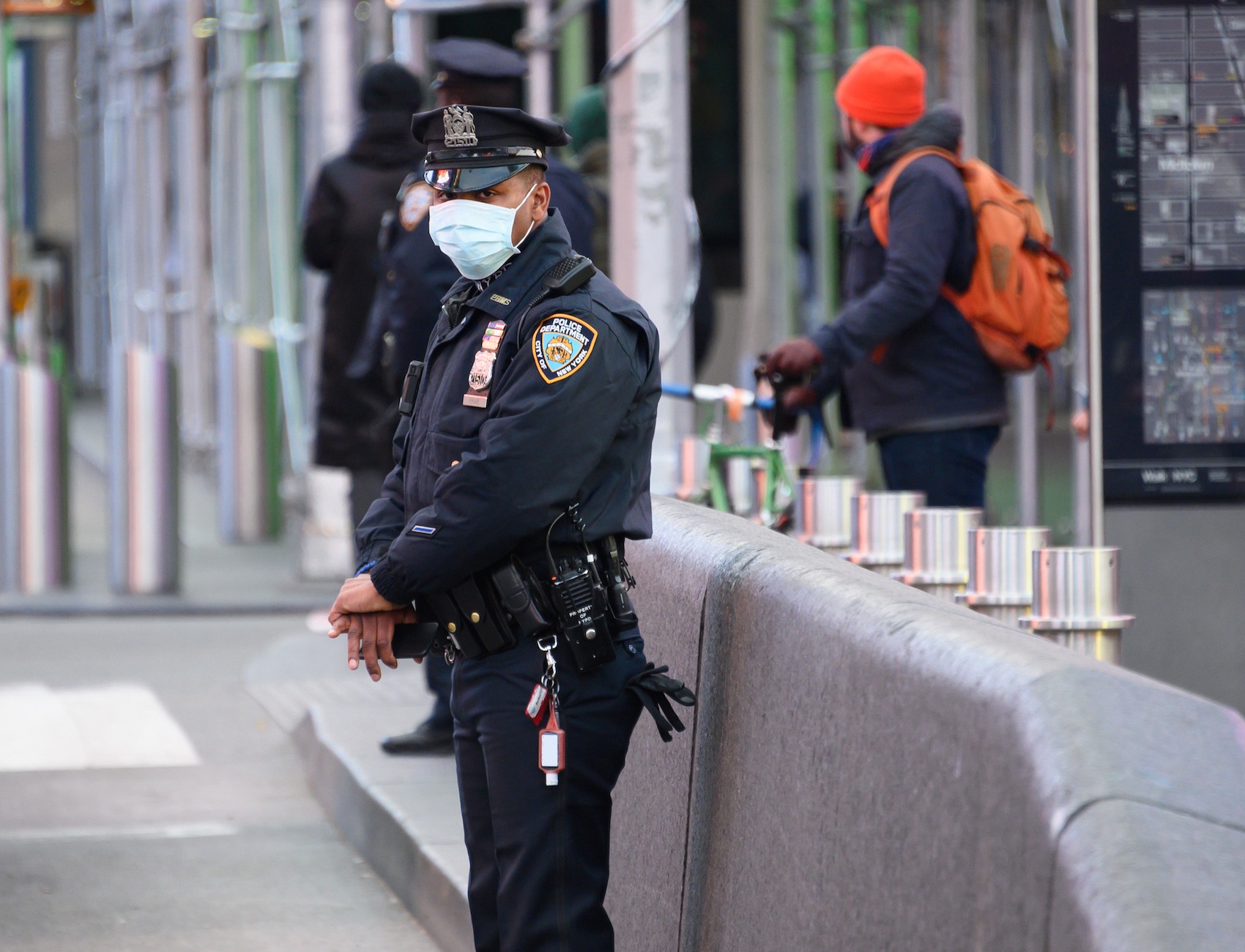Policing Coronavirus
As infections and deaths mount, state leaders and law enforcement are turning to tough-on-crime tactics in the face of the COVID-19 outbreak.

This piece is a commentary, part of The Appeal’s collection of opinion and analysis.
In late March, the Department of Justice reportedly sought, in light of the COVID-19 pandemic, a number of enhanced emergency powers, including the ability to ask judges to detain people indefinitely without a trial.
The Democratic-majority House quickly shot down the proposal, as did a handful of Republicans, so it is unlikely to come to fruition. But DOJ is not alone in turning to law enforcement in response to the outbreak—and that is worrying.
Law enforcement in America, already fragmented and feeling under siege, seem to be seizing the opportunity to use a tough-on-crime approach to attack a health crisis. Policing a pandemic will only further harm the same communities it pretends to protect, without alleviating any health and welfare concerns caused by the virus.
Already, city and state leaders have taken sweeping actions in accordance with the Centers for Disease Control and Prevention guidelines, which recommend strict social distancing in order to contain the virus’s spread. New York Governor Andrew Cuomo, for example, created a containment zone around New Rochelle, where there’s been a major coronavirus outbreak, and on Monday, he increased fines for people who do not obey social distancing rules. And multiple states, counties, and cities have issued stay-at-home orders to keep people in their homes, mandatory curfews, and ordinances that forbid gatherings of more than 10 people.
New York City Mayor Bill de Blasio said the police department will begin enforcing social distancing in parks: People are allowed in, but will be fined if they congregate in groups, he warned. This weekend, NYPD officers arrested at least three people for allegedly congregating outside, possibly exposing the officers and arrestees to COVID-19, according to The Intercept. Police in Tampa, Florida, arrested a pastor who held Sunday services in violation of Florida’s order against large gatherings. (Even as Florida beaches remain open.)
In mid-March, Chicago’s health department announced that anyone who has tested positive for COVID-19 or anyone who is symptomatic, could be fined up to $500 for each instance they refuse the city’s shelter-in-place order, raising the additional concern of “charge stacking,” or piling on multiple charges for the same criminal act.
Policing has not been limited to ensuring people obey quarantine orders. Two men in Chicago were arrested separately for coughing. Another man in Illinois was arrested and charged with “reckless conduct” because he went into a store when he should have been under home quarantine. In California, people are calling the police to complain about the sounds of neighbors coughing. A woman in New Jersey, who was arrested for driving while intoxicated, coughed on the officers and told them she was sick; prosecutors charged her with “false public alarm.” New Jersey state officials further said they would prosecute false claims of coronavirus cases on social media.
Not only do these law enforcement efforts put officers and arrestees in danger, they are also unproductive and reflect the worst impulses of the American criminal justice system: overcriminalization and the race and class discrimination that comes with it. While it may feel good in the short term to punish individuals for what appear to be choices, it’s counterproductive to improving public health and allows the actual problem—bad public policy—to escape unnoticed.
For example, Barr and other leaders have only begun cracking down on people hawking fake COVID-19 cures in recent weeks, despite largely ignoring the persistent problem of scamming for years. Writing in Slate, former federal prosecutor Ankush Khardori argued that Barr’s March 16 memo, instructing U.S. attorneys to focus on prosecuting, without any additional resources, “wrongdoers seeking to profit from public panic” is evidence of the federal government’s long-term failure to stem the flow of corporate malfeasance.
The American system of criminal punishment has always relied on a binary notion of individual choice as a way to justify imposing harsh sentences on individuals. Violate the curfew? Face arrest or fines. Selling fake cures? Face prosecution.
But the people in charge, the executives themselves, face little to no punishment. President Trump, for example, can make false and unscientific claims—including severe underestimations of the seriousness of COVID-19, making unverified claims about treatments, and spurious theories it would “go away”—on his bully pulpit, and no one can stop him. A county can implement shelter-in-place, but is under no legal obligation to provide that shelter to those who need it most.
Many have no choice but to trust that the government has our best interests at heart, and there is limited legal recourse when they do not. Instead, it is easier to punish individuals by taking away their liberty and dignity.
